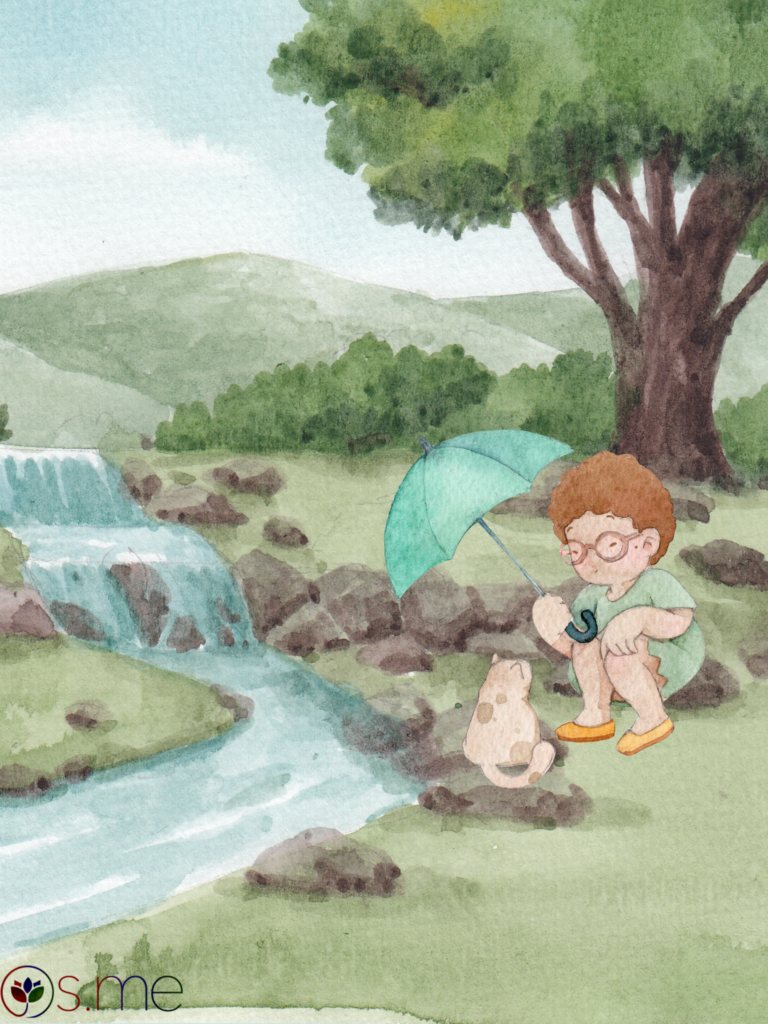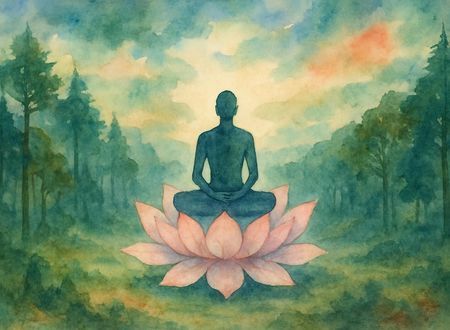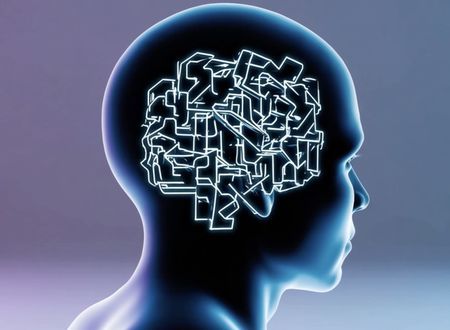If you are concerned about how much time you spend on social media or online shopping it might be helpful for you to take an internet detox with daily meditation.

Daily Meditation
- Practice of daily meditation actually changes your brain.
- Just 20 minutes a day strengthens your concentration.
Key points covered in this post:
- Breathing meditation techniques to calm yourself instantly when the feelings overpower you
- How to do a body scan that will help you de-stress and fall asleep faster
- How to visualize yourself being happy and healthy
- Easy mindfulness and gratitude meditation practices
- How to use movement as part of your meditation exercise
- Ways to enhance your meditation practice
Simple methods for daily meditation
When you are addicted to the internet, it can be hard to remember that there are other parts of your life. You may have spent so much time on social media and websites that you forgot how to be with yourself. It is important to take time each day to meditate and spend time with yourself to understand who you are as an individual truly. Witness and experience your feelings and emotions.
Meditation can help with anxiety, stress, depression, and other mental health issues. Today we are going over some mini-daily meditation practices that will help you get started on your journey of self-discovery!
Practice deep breaths
When the urge to go back to the screen overpowers your feelings, begin focusing on your breath.
- Deep breaths.
- Inhale.
- Exhale.
- Keep breathing in and out, just the same way, for about a minute or so, until the tension leaves your body and you feel relaxed again .
Meditating and focusing on breath can bring instant calm, and you can start to feel better instantly.
Practice grounding
This is a quick, simple exercise that you can do as a part of your daily meditation. Grounding is a technique that helps you to connect with the earth and ground yourself. This can be useful when you’re feeling anxious or restless, especially if you’re in a place where it’s hard to get up and walk around.
- Focus on your breathing. Breathe deeply, taking time to inhale and exhale fully. Feel the air moving in and out of your body, noticing how it feels as it flows through your nose or mouth into your lungs and backs out again through pursed lips or an open mouth. Try focusing on one particular sensation: perhaps the warmth of air entering the top of your head; maybe concentrate instead on its coolness as it passes through your throat; concentrate on its wetness as it fills up all parts of our lungs before flowing back out again!
- Focus on the present moment. When we’re being mindful about things like breathing, being aware doesn’t mean thinking about what happened earlier today at work or trying to remember what we ate for breakfast this morning—the past is over now! Instead, we can focus entirely on what’s happening right now within ourselves without worrying about anything else (or anyone else) around us – just us here together alone!”
Body scan
- Lie down with your legs extended, one hand on your belly, the other on your chest.
- Slowly breathe in and out. Focus on the rise and fall of each inhale, the relaxation of each exhale. Don’t try to control y
- our breath; let it come naturally as you focus all of your attention on this simple act of breathing.
- Focus solely on these two parts of yourself: the rise and fall of your chest—and the rise and fall of your belly. Observe how these muscular movements cause changes in pressure within both regions when air enters or exits them—and try not to think about anything else but those changes for several minutes until it feels natural to resume normal breathing patterns again without focusing too much attention on them.
Practice visualization
Visualization is a powerful tool for people who want to change their lives. It’s simple, it’s effective, and it can be done at any time. Visualize yourself being in the situation you want to be in. See yourself doing the things that make you happy or taking care of tasks that need completing. If visualization is new to you, try imagining yourself achieving your goals and seeing how great it feels when those goals come true. Visualize yourself being happy and healthy and enjoying your life without relying on anything else but yourself!
The more detailed your visualization is, the more effective the practice is. Because if there are any negative thoughts associated with what you’re visualizing, they will bring more negative thoughts into reality. That will prevent any progress, so ensure every detail is positive while doing this meditation technique!
Practice mindfulness
The practice of mindfulness means focusing your attention on the present moment without judging or analyzing it. It’s about being fully aware of what is happening in your mind and body at any given time.
When practicing mindfulness, you are intentionally paying attention to what’s happening. This can be as simple as focusing on your breathing or how it feels when you walk down the street. It can also involve observing unpleasant thoughts or emotions that arise during a difficult situation without getting caught up in them and letting them take over your mind (this is called an acceptance).
By focusing on what’s happening around us instead of our thoughts, we learn how to react more skillfully in life situations rather than reacting automatically based on our past experiences or habitual responses (this is called self-regulation).
Practice gratitude
Take five minutes each day for a week and write down one thing that you’re grateful for in your life. That could be anything from the clothes on your back, to the roof over your head, or even just being able to eat something tasty for dinner tonight. Just take a moment before logging off and think about what makes up this life of yours—and then write it down!
Gratitude is a practice of being thankful for all the good things in your life, no matter how small they are. It’s also about recognizing that you have everything you need to be happy right now. So when we realize that we already have everything we need to be happy, we don’t feel the need to seek out more stuff or temporary pleasures like social media use.
If you want to stop being addicted to the internet, you need to practice gratitude. Gratitude is a powerful force that can help us shift our focus away from what we don’t have and focus on what we do have. When we’re grateful for everything in our lives, including our health and relationships, it becomes easier not to feel like we need distraction or entertainment all the time.
Practice movement

Movement can be a form of meditation on its own, but it’s also a way to clear your mind and prepare yourself for the more traditional sitting meditations.
Movement is one of the most powerful tools in meditation. Here are some ways you can incorporate movement into your practice:
- Take a walk outside (or inside). The fresh air will help clear your head, while getting some exercise helps stimulate blood flow to the brain and make it easier for you to focus on other tasks afterwards.
- Do yoga or tai chi in front of the TV or computer when you’re feeling restless during an episode of Game of Thrones or Breaking Bad that’s making it hard for you to concentrate on anything else (just don’t get too distracted by those dragons).
- Jog around the block while listening to an audio recording or podcast of your favorite meditation teacher. The rhythmic movement and focus on your breath will help you get into a meditative state more quickly.
Mantra affirmations
Mantras are a way of repeating a phrase to yourself, often in a rhythmic way. They can be words, phrases or even sentences. Mantras should be something that feels good to say and not like you’re repeating something you’ve been told to repeat. For example:
- “I am strong”
- “I can do this”
- “I am worthy of love.”
Affirmations are similar to mantras but they’re more positive statements about yourself or your goals that you can say out loud (or in your head) each day. For example:
- I am happy with my life as it is right now and I trust in the process of life itself – no matter what happens today or tomorrow!
- *Note: If there are any negative thoughts that come up during meditation time those are the perfect times for affirmations because they will help create space between yourself and those thoughts so they don’t take over everything else!
How to enhance your daily meditation practice?
- Journaling and writing for 5 minutes daily
- journaling can help you explore and find creative solutions to problems
- journaling can help you become more aware of your emotions and thoughts
- journaling is a way to practice mindfulness
- journaling can help you get in touch with your creativity
- journaling can help you stay focused
Journaling and writing is a powerful tool that can help you get in touch with your emotions, become more aware of the present moment, and even find creative solutions to problems.
You may even find that it helps you stay focused on what’s important to you. The act of writing things down has a way of slowing us down—even if we’re writing about something as trivial as our grocery list or our plans for the next day.
This simple act allows us time for reflection; we might not be able to see the obvious solution right away because all we see are thoughts running wildly through our minds. Writing them down allows them some space so they’re not competing with other thoughts all at once—which means there’s more room for clarity in our heads!
These mini-meditations can be done every day.

They are short and simple to do, but they can have a big impact on how you feel and how you live. They will help you connect with yourself, with others, and with the planet.
These mini-meditations are a great way to end your day, or to pause during your day.
A peer study on impact of daily meditation
Brief, daily meditation enhances attention, memory, mood, and emotional regulation in non-experienced meditators
We randomized subjects (ages of 18-45) who were non-experienced meditators into either a 13-min daily guided meditation session or a 13-min daily podcast listening session (control group) for a total duration of 8 weeks.
We examined the effects of the daily meditation practice relative to podcast listening on mood, prefrontal and hippocampal functioning, baseline cortisol levels, and emotional regulation using the Trier Social Stress Test (TSST). Compared to our control group, we found that 8 but not 4 weeks of brief, daily meditation decreased negative mood state and enhanced attention, working memory, and recognition memory as well as decreased state anxiety scores on the TSST.
Furthermore, we report that meditation-induced changes in emotional regulation are more strongly linked to improved affective state than improved cognition. This study not only suggests a lower limit for the duration of brief daily meditation needed to see many benefits in non-experienced meditators, but suggests that even relatively short daily meditation practice can have similar behavioral effects as longer duration and higher-intensity mediation practices.
Source: National Library of Medicine
FAQs
How do I know if I am meditating correctly?
The most important thing is to focus on the present moment and be mindful of your breathing, body sensations, and emotions without judgment or forcing them. If you find yourself distracted by thoughts or feelings, acknowledge them and return your focus to the present moment. Additionally, it’s also helpful to practice with a teacher or experienced practitioner who can give personalized guidance on proper meditation techniques.
You know you’re meditating right when you feel calmer and more present in your daily life and routine. You may notice yourself responding to stressful situations with better clarity and composure or feeling more connected with others.
What should you not do when you meditate?
The goal is not to go wrong but to focus throughout your meditation. This way, there are a few stuffs that you can’t do, or you’ll lose focus. These are:
- Slouching or hunching can make it difficult to focus on your breath and body sensations. Maintaining a good posture is important for meditation.
- Don’t force it, do it willingly. When you’re restless, do not fight the distracting thoughts or feelings that arise. Acknowledge them, and then return your focus to your breath.
- Don’t get hung up on “doing it right.” Everyone’s experience is unique; concentrate on the present moment and stay aware of your breath and body sensations.
- Avoid distractions such as phones and other screens during meditation. This will help you stay mindful of the present moment and reap the benefits of meditation.
- Don’t give up on yourself. Embrace patience because it’s normal to experience thoughts and emotions throughout the process – remember to acknowledge these kindly and return your concentration to your breath when you get distracted.
How long before you see the benefits of meditation?
Ideally, meditation’s benefits are cumulative, meaning you may begin to feel them after a few sessions. Regular practice is key; it can take anywhere from 5-8 weeks to start noticing the signs and impact meditation has had on your life. The effects of daily meditation can include more clarity in thought processes, increased resilience to stress, and enhanced emotional well-being.
When should you not meditate?
You may have a routine or your daily schedule on medication which is right, by the way. However, there are times when you cannot meditate at all. These are the instances:
- When you are feeling extremely exhausted or stressed out. It’s ideal of you to take a break. One day won’t harm.
- Instances when you have severe pain, discomfort, or nausea. These are not frequent occasions, but when they do occur, please take a break from meditation.
- When you are feeling overwhelmed and anxious. Meditation is supposed to be calming, not overwhelming! Take a few minutes to relax and focus your thoughts before starting your meditation practice.
- When you are under the influence of drugs or alcohol. In a state like this, it’s best to avoid meditating as it can be potentially dangerous. It offers realistic expectations or desires.
- Unfocused and unmotivated? Don’t do it. If your mind is not ready for meditation, give yourself a break. Staying focused during meditation is very important.
What happens when you meditate daily?
Regular and daily meditation living practice can positively impact your physical, mental, and emotional health. Daily meditation has been linked to improved moods and better sleep quality. Ideally, what is even more notable is little things will stop bothering you, and you’ll be more patient, less stressed, and less depressed. You’ll also improve your overall focus and self-awareness and build resilience. Daily meditation will keep you out of the internet hence loving and connecting to real life. This is why on November 24, people preach the importance of meditation throughout the world.
Conclusion
The internet is an amazing tool but it can also be a distraction. If you find yourself spending too much time online and not doing the things in life that are important to you, then we have some great tips for how to curb those bad habits. The key is self-awareness and consistency, so try our suggestions below to see if they work for you!









Comments & Discussion
3 COMMENTS
Please login to read members' comments and participate in the discussion.